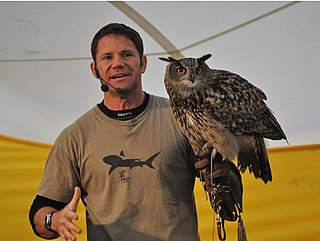Top 68 Reefs Quotes & Sayings
Explore popular Reefs quotes.
Last updated on April 14, 2025.
Are coral reefs growing from the depths of the oceans? ... [The] reply is a simple negative; and a single fact establishes its truth. The reef-forming coral zoophytes, as has been shown, cannot grow at greater depths than 100 or 120 feet; and therefore in seas deeper than this, the formation or growth of reefs over the bottom is impossible.
Ten percent of the big fish still remain. There are still some blue whales. There are still some krill in Antarctica. There are a few oysters in Chesapeake Bay. Half the coral reefs are still in pretty good shape, a jeweled belt around the middle of the planet. There's still time, but not a lot, to turn things around.
The more we heat up the planet, the more it costs all of us, not just in money, but in colossal famines, displacements, deaths, and species extinctions, as well as in the loss of some of the things that make this planet a blue-green jewel, including its specialized habitats from the melting Arctic to bleaching coral reefs.
On the whole, and providing one is in good spirits and feeling reasonably bright, it is not hard to converse for a short space of time on subjects about which one knows little, and it is indeed often amusing to see how cunningly one can steer the conversational barque, hoisting and lowering her sails, tacking this way and that to avoid reefs, and finally racing feverishly for home with the outboard engine making a loud and cheerful noise.
By 2050, at bio-extinction's current rate, between 25 per cent and 50 per cent of all species will have disappeared or be too few in numbers to survive. There'll be a few over-visited parks, the coral reefs will be beaten up, grasslands overgrazed. Vast areas of the tropics that have lost their forests will have the same damn weeds, bushes and scrawny eucalyptus trees so that you don't know if you're in Africa or the Americas.
In the course of time I have learned to tramp about coral reefs, twenty to thirty feet under water, so unconcernedly that I can pay attention to particular definite things. But after all my silly fears have been allayed, even now, with eyes overflowing with surfeit of color, I am still almost inarticulate. We need a whole new vocabulary, new adjectives, adequately to describe the designs and colors of under sea.
Baseball is about homecoming. It is a journey by theft and strength, guile and speed, out around first to the far island of second, where foes lurk in the reefs and the green sea suddenly grows deeper, then to turn sharply, skimming the shallows, making for a shore that will show a friendly face, a color, a familiar language and, at third, to proceed, no longer by paths indirect but straight, to home.
It's coming to America first, The cradle of the best and of the worst. It's here they got the range And the machinery for change And it's here they got the spiritual thirst. It's here the family's broken And it's here the lonely say That the heart has got to open In a fundamental way: Democracy is coming to the U.S.A. O mighty Ship of State! To the Shores of Need Past the Reefs of Greed Through the Squalls of Hate Sail on, sail on.
The theory which I would offer, is simply, that as the land with the attached reefs subsides very gradually from the action of subterranean causes, the coral-building polypi soon raise again their solid masses to the level of the water: but not so with the land; each inch lost is irreclaimably gone; as the whole gradually sinks, the water gains foot by foot on the shore, till the last and highest peak is finally submerged.
Coral reefs are under assault. They are rapidly being degraded by human activities. They are over-fished, bombed and poisoned. They are smothered by sediment, and choked by algae growing on nutrient-rich sewage and fertilizer run-off. They are damaged by irresponsible tourism and are being severely stressed by the warming of the world's oceans. Each of these pressures is bad enough in itself, but together, the cocktail is proving lethal.
Coral reefs, the rain forest of the ocean, are home for one-third of the species of the sea. Coral reefs are under stress for several reasons, including warming of the ocean, but especially because of ocean acidification, a direct effect of added carbon dioxide. Ocean life dependent on carbonate shells and skeletons is threatened by dissolution as the ocean becomes more acid.
The apparent physical stability of reefs belies an underlying natural turmoil of growth, death and destruction of calcareous organisms. Much like a modern city, reefs are constantly being rebuilt and torn down at the same time. Corals are the bricks, broken pieces of plant and animal skeletons the sand, and algal crusts and chemical cements the mortar. Reef growth is determined by the production, accumulation, and cementation of all this calcareous stuff into solid limestone.
It turns out that hyperbolic structures are very common in nature, and the place where lots of people encounter them is coral reefs. Sea slugs, and a lot of other organisms with frilly forms, are biological manifestations of hyperbolic geometry, which is also found in the structure of lettuce leaves and kales, and some species of cactus.
One of the sports I do - my wife thinks I'm nuts - is open-water spear fishing, what we call blue-water hunting. We get in a boat, and we go offshore, normally about 30 miles. So when you jump off the boat, there are no reefs, and the bottom is no longer fifty or a hundred feet: it's thousands of feet. It's sort of like being in outer space.
Tourism is very important for Egypt as fewer tourists means fewer jobs! Of course there are positives and negatives from tourism... Tourism is a type of use, if not properly planned and managed it can destroy the very resources that brings the tourists. No reefs equals no diving, it's a simple equation. Tourism development has to be appropriate.

















































